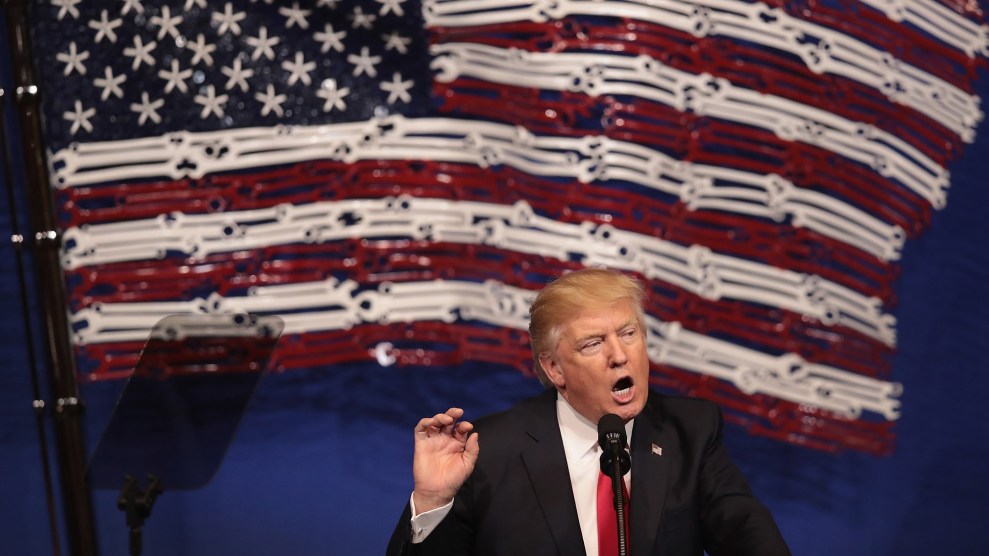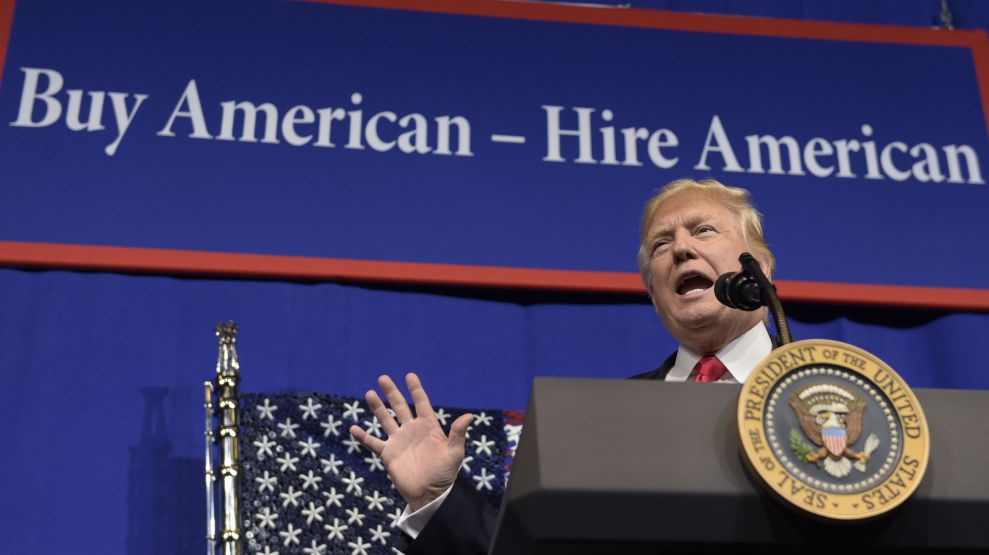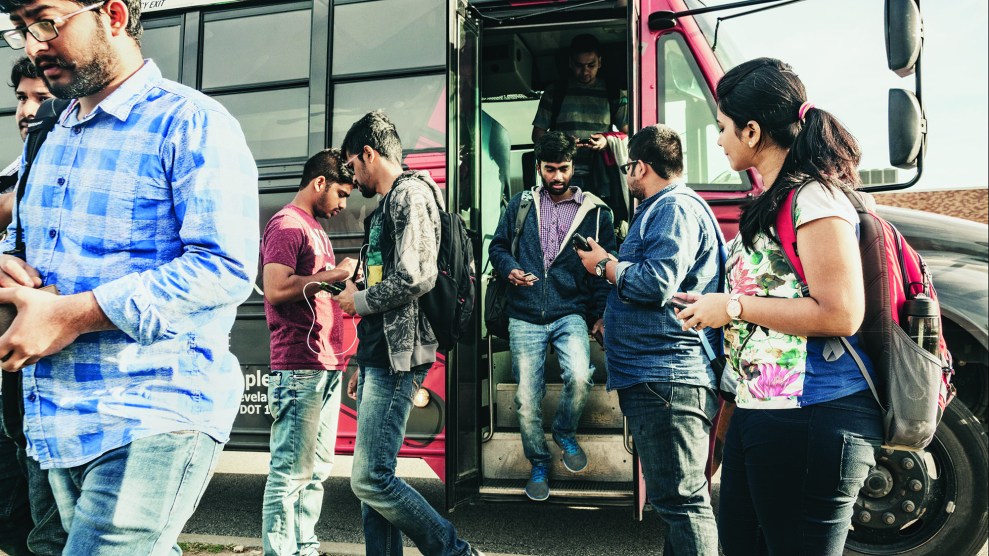
Permanent residency applications awaiting processing at a Dallas USCIS officeJohn Moore/Getty
For decades, attempts to reform the United States’ immigration system have died in Congress. But in July, Michelle Canero, a business immigration lawyer in Miami, noticed that the House of Representatives had quietly passed its biggest change to US immigration law in decades. Without a hearing, a bipartisan majority had sent a bill to the Senate that would radically change how employment-based permanent residencies are allotted. This summer, it appeared ready to sail through the Senate as well—again without even a hearing. But when Canero looked into the details of the bill, she became alarmed.
The Fairness for High-Skilled Immigrants Act is a longtime priority of Silicon Valley and its large population of Indian nationals, many of who work in the tech industry. The bill would effectively divert almost all available employment-based green cards to people from India for about a decade, easing a painful backlog for the community and helping ensure that US tech companies remain attractive to Indian workers. But critics argue the bill would hurt every other industry that relies on foreign talent, and would come at the expense of immigrants from every other country.
“Reading this legislation, it’s actually very restrictionist—and it’s going to have a lot of adverse consequences,” Canero remembers thinking. Though she had no relevant political experience, Canero joined the board of a group of immigration lawyers and began flying to DC in September to buttonhole senators before the bill could pass and wind up on President Donald Trump’s desk.
The last time substantial immigration reform had a chance was in 2013. President Barack Obama had just won reelection, prompting elements of the Republican Party to rethink the GOP’s poor standing with Latinos and soften its line on immigration. Into the fray marched Silicon Valley. In April 2013, as the Senate took up comprehensive immigration reform, Facebook CEO Mark Zuckerberg and other tech executives launched an initiative and website called FWD.us with millions in funding to promote reform, in particular championing young people living in the country without legal status. Tech saw itself leading the way to a more open and tolerant America, while securing key changes in their favor.
But reform failed, and three years later Donald Trump put the Republican Party in the hands of its anti-immigrant wing. Silicon Valley appears to have adapted. While FWD.us still advocates comprehensive reform and a way for people who entered the country as children to become citizens, the industry’s lobbying wing, including the tech trade group Compete America, is pushing the Fairness for High-Skilled Immigrants Act, which is fundamentally a concession to the politics of the Trump era: Forget expanding immigration; it’s every person (and every industry) for themselves.
“It’s really terrible to be in a position where immigrants are fighting immigrants over the scraps on the table,” says Charles Kuck, an immigration attorney in Atlanta who opposes the legislation. “That’s what this bill does.”
For the past 20 years, tech companies have hired a growing number of people from India to work in the United States. Many come using temporary H-1B employment visas. These Indian nationals generally want employment green cards so they can live in the US permanently and avoid the labor exploitation that can come when a worker’s right to be in the country is tied to their boss. While people on H1-B visas can bring their spouses and children to the US on temporary H-4 visas, workers with permanent residence can in turn sponsor spouses and children for the same status. Without it, foreign-born children of H1-B workers who have grown up in the US face deportation when they turn 21. These Indian tech workers and their families are caught in a growing green card backlog that under current law, by some estimates, will take about 50 years to clear. If a green card–seeking worker dies while in line—which many will—his or her spouse has to leave the country. The community lives in fear of children aging out and wives being sent away after decades in the US.
This devastating situation is caused by two clauses in federal law. One limits the number of employment green cards to 140,000 per year, the other requires that no more than 7 percent go to people of any one nationality. When the caps were created in 1965, they were intended to prevent discrimination against non-European immigrants. But today they’ve become a barrier to immigrants from India, soon projected to be the world’s most populous country, who receive about 10,000 a year, the maximum under the formula, as well as green cards that go unused elsewhere. In 2018, Indian nationals received over 38,000 employment-based green cards.* The math favors immigrants from virtually every other country that is not sending tens of thousands of workers to the US each year, and who can often secure employment-based green cards in just a few years.
According to U.S. Citizenship and Immigration Services data, close to 400,000 people are now waiting in the employment green card backlog, of which 77.6 percent are Indian. (Chinese citizens, who face the second-largest backlog, constitute 17 percent of the backlog.) The numbers do not include the spouses and children; according to the Cato Institute, the total number of Indians in the backlog is closer to 600,000.
The rules have created a tragedy for the Indian immigrant community and, together with tech companies that want to appease their workers and keep US jobs attractive, they have lobbied Congress to pass the Fairness for High Skilled Immigrants Act for nearly a decade. The bill would eliminate the per-country cap. Instead, almost all of each year’s 140,000 employment green cards would be dispersed on a first-come, first-serve basis within each category of employment green card. The bill outlines a three-year transition period during which a small percentage of green cards would be reserved for people from countries other than India and China, as well as a small number reserved for Chinese nationals. But given the backlog of applicants from India, experts expect they would get virtually all green cards not specifically set aside for nationals of other countries for nearly a decade—the time it would take for the backlog to diminish.
“We support legislation to eliminate ‘per-country’ caps,” said Andrew Moriarty, deputy director of federal policy at FWD.us, in a statement shared with Mother Jones. “Doing so will make the system fairer for immigrant families while also strengthening the United States’ ability to recruit and retain top global talent by establishing a fair and predictable path to permanent legal status. We do not believe people should have to wait 50 years for a green card simply because of where they were born.”
The Indian community is pushing the bill, as its title suggests, as a matter of fairness. “The bill is about equality and equal treatment under the law,” says Aman Kapoor, the co-founder of Immigration Voice, the group that is dedicated to alleviating the backlog for Indian nationals. “It has nothing to do with other countries’ times going up or down. Countries don’t get green cards. People get green cards.”
But some immigration lawyers see a slew of potential unintended consequences. Although thousands of Indian nationals in the backlog do not work in the tech industry, most of them do, according to experts. “Effectively, this legislation is going to kill employment based immigration” outside of the tech industry, says Canero.
Indian nationals working in tech using a majority of the H-1Bs visas available each year. While H1-Bs can be extended after applying for a green card, other employment-based visas more commonly used in other industries cannot. Under the bill, the line for new green card applicants would be longer than the length of such employment visas, keeping workers from applying for permanent residency in order to keep their visas, or stripping them of their ability to work in the US after applying. That means the bill would “choke off green cards for every profession that isn’t IT—health care, medical research, basic science, all kinds of engineering; chemists, physicists—people working on Artificial Intelligence and climate change mediation technologies,” as immigration attorney Ira Kurzban warned Senate Majority Leader Mitch McConnell (R-Ky.) in an August letter opposing the legislation.
The bill could also prevent foreign students from taking jobs in the US after graduation. Right now, foreign students from countries other than India who earn a degree in science, technology, engineering, or mathematics often remain in the US under employment based visas, until their green cards typically come through within a few years. Canero warns that if those graduates end up in the back of a green card line that stretches a decade or more, they won’t stay in the US. With employment visas that won’t last long enough to apply for permanent residency, they would face little little chance of getting a green card—a position similar to Indian nationals in the current backlog. “We’re gonna lose all our STEM” graduates, she says.
Kuck argues that new barriers to foreign workers settling could discourage vital overseas investment. “There’s about $500 billion of foreign investment every year in the United States,” says Kuck. “If all of a sudden, companies from countries that do the big chunk of our foreign direct investment—which has a massive impact on our economy—no longer can immigrate their senior employees, their directors, their scientists, and they are stuck in this same 10-year line, will they continue?”
The bill could also close off the only avenue currently available for young people who entered the country undocumented as children to get green cards, which is through their employers. If the Fairness for High-Skilled Immigrants Act passes, Canero says young people on her own law firm’s staff whom she is trying to get green cards could be pushed to the back of the line, while their temporary status in the US, known as Deferred Action for Childhood Arrivals, will expire long before they come through.
When the bill reached the Senate in July, Sens. Kamala Harris (D-Calif.), who represents Silicon Valley and whose mother immigrated from India, and Mike Lee (R-Utah), whose state has become a second home to major tech companies seeking locations outside of California, tried to pass it through unanimous consent, again without a hearing. Several Republicans initially objected, but Lee won them over with tweaks to the bill and it appeared ready for passage.
Then, Sen. Dick Durbin (D-Ill), the Senate’s second ranking democrat, objected. He introduced an alternative bill, the RELIEF Act, that would do away with the country caps but also raise the number of green cards, with the aim of permanently ending the backlog and making sure every industry has equal access to foreign workers. Reasoning that Republicans under Trump will never vote to increase visas, the Indian community sees Durbin’s proposal as poisoning their efforts, and view his call for hearings on their bill as an attempt to kill it. A Congressional aide, who spoke on condition of anonymity, said Durbin and Lee have met to try to forge a path forward.
Though members of the Indian immigrant community are all in on the fight for the Fairness for High-Skilled Immigrants Act, the bill leaves some protections for them on the table. Statutory changes to prevent children from aging out and give work and travel authorization to spouses and children while they wait for green cards were left out of the bill. (Durbin’s RELIEF Act would protect children from aging out.) Even if the Immigration Voice-backed bill passes, Kurzban predicts it won’t entirely solve the problem, and that more than 160,000 Indian nationals in the backlog today would still be there in 10 years.
The debate over the bill has turned nasty, as Immigration Voice built a pressure campaign against Durbin, setting up telethons to his office and in-person protests. Their message was that Durbin is racist against people from India. “Sadly @SenatorDurbin thinks you are subhuman because you are Indian,” the group said in one tweet last month. “He thinks your children are subhuman—undeserving of equal opportunity because you are Indian. This is why he is holding your equality ransom to more green cards.”
Call Durbin and “ask, why he hates Indian immigrants so much?” another tweeted urged.
Two protests in one week, children standing in the cold, why does @SenatorDurbin not recognize these #immigrants as equal to any other human being in line for an employment based Green Card?
Call him 202.224.2152 & ask, why he hates Indian immigrants so much? #SeparateIsNotEqual pic.twitter.com/sfsF2XMzft
— Immigration Voice (@immivoice) October 14, 2019
Immigration Voice draws analogies between the plight of the Indian community under the backlog and African Americans under Jim Crow, sometimes tweeting the hashtag #SeparateIsNotEqual. Kapoor of Immigration Voice says opposition to the bill echoes the opposition of segregationists to civil rights for African Americans, as they sought to preserve a privileged status. “‘I will have to wait for African Americans to get up from the seat that they are occupying, and that will increase my wait time at the restaurant,’” he says, paraphrasing a segregationist. “It’s a failed argument. It’s the same argument.”
But the group has not cozied up to civil rights groups. Instead, it has chosen to work with the Republican Party and Silicon Valley’s Goliaths while attempting to win over Trump. One of the group’s directors, Neil Patel, co-founded the conservative Daily Caller alongside with Fox News host Tucker Carlson. Another, Robert Hoffman, is a longtime tech executive and lobbyist. The group shares a lobbyist, Scott Corley, with the tech trade group Compete America. The organization also has a history of juxtaposing the plight of Indian nationals waiting for green cards with undocumented people entering the country—a juxtaposition that appears intended to portray them as more deserving of being in the United States, even though undocumented immigrants crossing the border are not going to provide immediate competition for employment-based visas.
In early 2018, after a brief government shutdown over immigration policy, Immigration Voice put forward a proposal—picked up by Rep. Kevin Yoder (R-Kan.) and Tulsi Gabbard (D-Hawaii)—to fund the border wall through a fee on green card applications in exchange for eliminating per-country caps. “Indian high-skilled workers will gladly, enthusiastically and happily pay for the border security or the wall if given an opportunity to do so in order to get fair treatment on green card waiting times,” Kapoor said at the time.
Immigration Voice has managed to get Republican senators on board, and Kapoor believes that in the absence of negative signals from the White House, Trump will sign the bill if it passes the senate. But the group faces persistent opposition from far-right anti-immigrant groups who want to cut legal immigration. Breitbart, the conservative news site, has been covering the bill, claiming it will lead to discrimination against American workers.
Leon Fresco, an immigration attorney and former aide to Sen. Chuck Schumer (D-N.Y.) who works on individual backlog cases for Immigration Voice, argues that the legislation isn’t a giveaway to the tech industry and doesn’t believe it will hurt other industries, many of which have their own Indian employees in the backlog. In fact, Fresco argues that the bill will empower tech workers at the expense of their bosses. Freed from temporary employer-sponsored visas, he says the workers will be able to advocate for raises and promotions, switch companies, or even start their own businesses. “This bill is not a bill that in any way, shape, or form helps the tech industry with the exception of it gets angry employees to stop yelling at their bosses,” he says. “The same thing that’s happening to Durbin has been happening to Mark Zuckerberg, Tim Cook, Bill Gates, etc. for years.”
Fresco argues that given the small amount of green cards available, and Republicans’ unwillingness to offer more, immigration advocates have to face the undesired and perhaps unfair short term consequences of pursuing an ultimately more just system. In the future, Fresco asks if the country wants to look back and say “’We didn’t fix this. Look at all of this carnage we caused where people kept getting treated differently just on their national origin.’ Or do you want to look back and say, ‘Yes, it was a bumpy road to fix it. But now everybody’s treated the same’?”
Correction: This sentence has been revised to reflect the total number of green cards issued to Indian nationals in 2018.


















